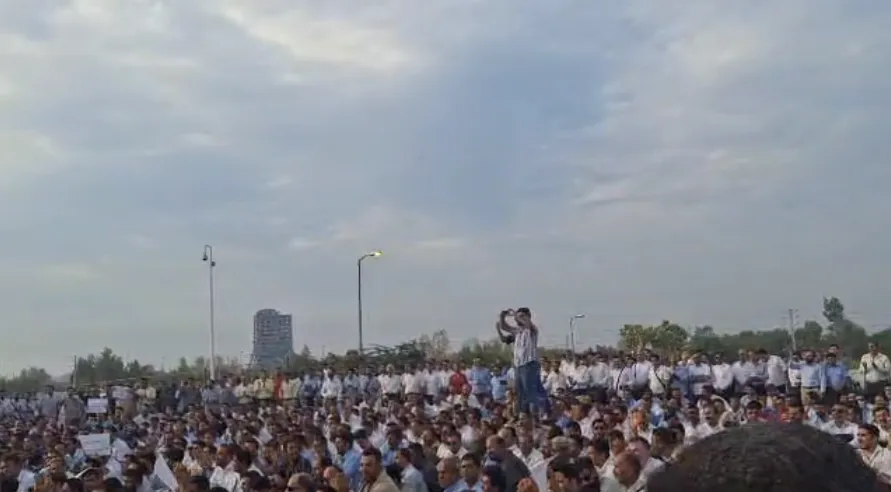Iranian oil workers at the South Pars facilities have launched a new wave of coordinated protests this week, spotlighting the harsh realities of their working conditions and the broader failures of Iran's labor system (see our previous report: Labor Protests Spread Across Iran).
The protests, termed #ProtestTuesdays, involved workers from several refineries, including those from the third and fifth facilities of South Pars (the world's largest natural gas field [1]). They marched several kilometers, demanding better wages, job security, and an end to systemic exploitation by corrupt management and the sub-contracting companies. These are firms that since the mid-1990s recruit casual workers for other companies, acting as middlemen in employer-worker relations to curtail bargaining power.

In the face of security clampdowns and repression, workers issued a bold statement, pledging to continue their actions until all demands are met.
The workers were determined to reach the protest gathering points, despite the difficulty. Workers from South Pars 2 in Kangan drove the 70-kilometer stretch, while others walked more than 5 kilometers without having breakfast, to be present at the protest. Such an onerous journey symbolized the determination of the workers to expose years of exploitation and to bring about changes to improve their conditions. Their demands include [2]:
· The right to organize, assemble, and protest
· Abolition of sub-contracting companies
· Immediate reinstatement of all dismissed workers
· Fulfillment of prior agreements, such as paid leave and camp fee*
· Implementation of the Job Classification Plan**
· Equal pay for the same job (whether the employee is permanent or temporary)
· Enforcement of 14-day rest periods for oil workers in remote areas without discrimination (whether the employee is permanent/temporary or local)
Protest slogans, like "Fair wages are our inalienable right" and "We do not want an anti-worker manager," point out the deep frustration of the workers, who have been compelled to bear deteriorating work conditions while providing the globe with energy and generating immense profits for employers.
The slogan "Fair wages are our inalienable right" reflects the workers’ demand for immediate relief from exploitation but reveals the limits of reformist aspirations within a capitalist framework. Such demands, while addressing surface-level injustices, do not challenge the system's fundamental structure. A "fair wage" still accepts the commodification of labor and the extraction of surplus value, leaving the root cause of exploitation untouched.
Most egregious is the case of Hojjat Rezaei and Yasser Ahmadinejad, two workers whose firing was facilitated by refinery managers, notorious for suppressing dissent. Hojjat Rezaei was the worker representative of the 6th South Pars refinery who was fired due to "extremist" labor activity. The categorization of simple trade union activities as "extremism" has only served to highlight the fragility of the Iranian oil industry.
Yasser Ahmadinejad, a worker of National Iranian Drilling Company (NIDC), publicly announced a series of purely economic demands in addition to professing his fierce loyalty to the Islamic Republic and the Supreme leader. He was nonetheless arrested, interrogated and fired from his job.
The case of Ahmadinejad reminds us of the raison d'être of any state, which is a tool of one class against another. Therefore, vigilance and clandestine trade union activity should be relearned by the new generation of advanced workers and communists.
The oil workers have begun to use their collective power through organized protests and only struggle educates the toiling masses. Their demand for worker representation and the abolition of exploitative subcontractors is a breath of fresh air for the Iranian labor movement.
The South Pars oil workers' movement testifies to the revolutionary potential that a united determined working-class force is able to unleash upon the world. Their actions show, very succinctly, that strike action is the most effective tool to challenge systemic oppression and win concessions.
This potential will be fully realized only if the workers are led by a party that truly represents their class, with leadership rooted in Marxist-Leninist principles, so as to dismantle not only the corrupt management of Iran's oil industry but the capitalist social relations embodied in it and wider society.
Furthermore, as Marxist-Leninists, we must reject any social-chauvinist support for the so-called "anti-Imperialist" Islamic Republic of Iran. The oil workers' struggle reminds one that liberation does not lie in aligning with one bourgeois state against another but in the hands of the workers themselves.
We call upon all the progressive forces and workers around the world to support the Iranian oil workers in their struggle. Solidarity and education are crucial in building a global movement that empowers the working class to rise against exploitation and take what belongs to them and not just "fair wages". Let us learn from the example of South Pars and organize, join us!
* A fee compensating the lack of adequate on-site housing and welfare services.
** An Iranian labor law that establishes standard wage and insurance policies, its implementation has been left to employers by the state.
Sources:
[1] WorldAtlas – "The Largest Natural Gas Field in The World" – July 5, 2018.
[2] Council for Organizing Protests of Informal Oil Workers – "A new chapter of #ProtestTuesdays" – November 26, 2024.


